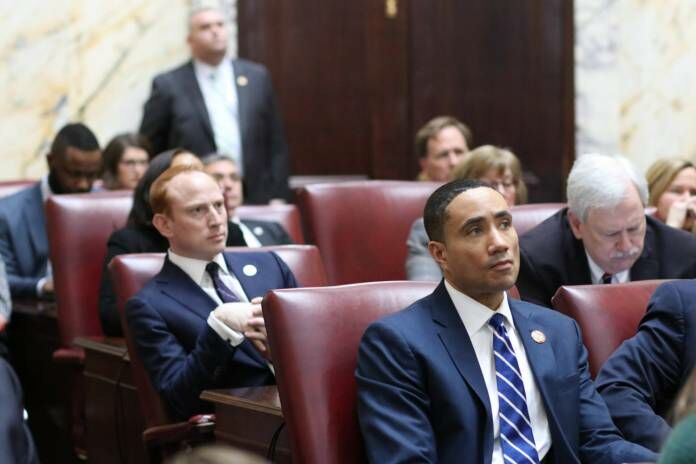This article was republished with permission from WTOP’s news partners at Maryland Matters. Sign up for Maryland Matters’ free email subscription today.

This content was republished with permission from WTOP’s news partners at Maryland Matters. Sign up for Maryland Matters’ free email subscription today.
Senate Judicial Proceedings Chairman William C. Smith Jr. (D-Montgomery) sent a letter to his fellow senators Thursday with proposals for legislation intended to address policing tactics in Maryland.
These proposals come on the heels of nearly a week of civil unrest following the death of George Floyd, a black man who died in police custody in Minneapolis on May 25.
“Our system is broken and we cannot continue to do what we’ve been doing,” Smith wrote. “Although we have made progress in recent years, it is far past time for us to reflect upon why it has taken the murder of yet another precious black soul in 2020 to muster the political will to push for meaningful reform.”
“As an elected official I certainly share in that responsibility.”
Smith said that there are instances of police brutality across the country, including in Maryland.
Several prominent cases in the state have made their way to the forefront in recent years.
In 2015, Baltimore resident Freddie Gray died a week after being held in police custody, leading to multiple days of riots. In 2018, an unarmed Robert White was shot by police in Montgomery County — the same year that 19-year-old Anton Black died after being in police custody on the Eastern Shore.
“The problems that plague this relationship are well documented,” Smith wrote. “So too are many of the solutions.”
The Judicial Proceedings chairman explained that this turbulent time provides an opportunity to tackle these systemic problems, following in the footsteps of those who had confronted similar challenges in the past.
“I understand lofty rhetoric and political talk is cheap,” he wrote. “That’s why I’m putting this into writing and asking for your support and input as we prepare for the next legislative session.”
Smith has asked that legislation be drafted to address several concerns surrounding modern-day policing in Maryland, including:
- Officer training
- Use of Force
- Militarization
- Prosecutorial intervention
- Liability caps
- The disclosure of personnel records
- The Law Enforcement Officers Bill of Rights
The Judicial Proceedings chairman is looking to reform police training practices, proposing that the Maryland Police Training and Standards Commission require recruits to undergo implicit bias training — including de-escalation and minimized use of force best practices, as well as “shoot/don’t shoot decision making” — and institute a protocol to utilize implicit bias data while hiring officers and during certification and performance evaluations.
Smith is also looking to put forth legislation that would prohibit certain use of force practices, such as chokeholds and strangleholds, require “comprehensive reporting” after each instance or threat of excessive force, and create imperatives for officers to intervene when they see excessive force employed, as was the case in Minneapolis.
Three other officers bore witness to Floyd’s death. For days, demonstrators across the country pushed Minnesota prosecutors to file charges against them for their inaction.
NBC News reported Wednesday afternoon that charges have now officially been filed against all four officers present.
Additionally, in his proposed bills, Smith is looking to require that officers “exhaust all other means” before discharging their firearms, warn individuals before shooting and ban the practice of shooting at moving vehicles.
Smith has also asked that bills be drafted that would ban police departments and other civilian law enforcement agencies from entering into 1033 purchasing programs, which allow them to purchase military-grade equipment and weaponry, and plans to put forth legislation that would prevent acts of police violence from being subject to municipal liability caps in hopes that it will deter departments from activities that could lead to the increase of government insurance premiums.
The senator also has an eye towards investigation and prosecution.
Smith is looking to reform the clause in the Law Enforcement Officers Bill of Rights that requires investigations into officer misconduct be performed by the Attorney General’s Office or another officer, and is similarly seeking to do away with the five-day waiting period currently required before interviewing officers involved in underlying incidents.
He has also recommended that an independent investigator or special prosecutor be established in Attorney General Brian E. Frosh’s (D) office to prosecute any cases of in-custody deaths, alleged police misconduct and instances of civilian injury or death at the hands of an officer.
Smith has asked that legislation be drafted that would make complaints, investigation records and disciplinary documents subject to review under the Maryland Public Information Act when those records relate to dishonesty, discrimination, the discharge of a firearm, deadly or improper use of force and sexual assault investigations.
Smith has also proposed the drafting of a bill that would allow non-law enforcement public officials to play an active role in the decisions to disclose prior complaints, and that the Maryland Police Training and Standards Commission submit annual reports on use of force complaints to the Maryland General Assembly.
Several news outlets, including CNN, have reported that the first officer charged in Floyd’s death had a series of prior complaints filed against him.
Efforts to publicize police personnel records in the state have been put forth in previous legislative sessions.
Del. Gabriel Acevero (D-Montgomery) proposed such measures under his 2020 push to have Anton’s Law police accountability legislation enacted. Sponsored by Sen. Jill P. Carter (D-Baltimore City) in the Senate, the bill made little headway in both chambers.
In his letter, Smith said that copies of his proposals will be made available to the public when the drafts are completed, and that the Judicial Proceedings Committee will be holding public bill hearings on them ahead of the legislative session.
“In the interim I want to hear from as many individuals and groups as possible,” he wrote. “If you have an idea of how we can move our state forward on policing reform my door is always open.”







